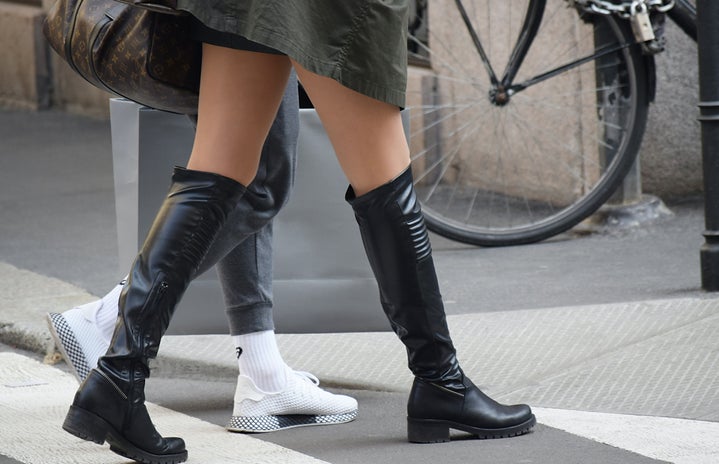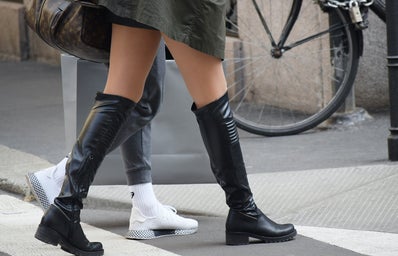“This world does not move without Black creativity.” -Melissa Kimble
When you think of streetwear in any form—tracksuits, bucket hats, hoop earrings, oversized clothing—it’s probably easiest to think about it in terms of its recent boom in popularity, especially in the designer world. However, streetwear, as many other “newly” popular fashion trends do, has a rich and colorful history behind it that spans decades. Unsurprisingly, this history is bursting with culture, specifically, Black culture.
Streetwear is categorized by an assortment of different cultures and aesthetics, including the hip-hop scenes of New York, the surf-skate and graffiti culture of Los Angeles and influences from sportswear, punk and even Japanese street fashion.
It all began in the late ’70s and early ’80s. While surfboard designer Shawn Stussy was selling t-shirts with his (now legendary) signature printed on them out of the back of his car in LA, hip-hop began to flourish and make its way through the streets of New York City. Along with the rise of the music genre came the rise of new celebrities and their influences on fashion and subculture.
Like many other forms of art, rap music and the fashion associated with it were infused with political statements. It was the era of Ronald Reagan’s War on Drugs, and the increased criminalization of drug use also led to the mass incarceration of people living in urban environments, specifically Black and Latino men. Disdain for the handling of anti-drug campaigns was made apparent in the music of the time, but the statements made in fashion were often more nuanced. Throughout the ‘50s and ‘60s high standards of “proper citizenry and dress” were the status quo, often enforced by upper-class white people. Streetwear was built in opposition to what was deemed “acceptable” by the masses, instead focusing more on comfort and do-it-yourself (DIY) elements.
Celebrities, especially musicians, played a huge role in the influence of streetwear, with different icons adopting different signature pieces. For example, famed rapper Tupac had a hand in the popularization of the snapback after wearing one in his music videos; and bucket hats took off after rappers Big Bank and LL Cool J became associated with them. One of the most iconic sneaker styles to ever exist— Air Jordans— was made popular by basketball player Michael Jordan. Tracksuits, another essential component of streetwear style, were made popular in part by the hip-hop group Run-D.M.C during a collaboration with Adidas. Hoop earrings have been worn by Black women since the 1920s, most notably worn by jazz singer Josephine Baker before being adopted into streetwear culture by artists like Mary J Blige, Lil Kim,= and Misa Hylton. Other musical artists that have had great influence include Eazy-E, Biggie Smalls, Snoop Dogg and Aaliyah.
However, few others have had such a large influence— especially regarding the DIY elements— than fashion legend Dapper Dan. Credited as one of the founding fathers of streetwear and logomania, Dapper Dan is a New York-based fashion designer known as the “king of knock-offs.” Dapper Dan started to rise in popularity after he began to illegally screen print designer logos onto his designs. In 1982 he opened a made-to-order store, buying monogrammed fabric and hardware from luxury department stores and tailoring them into new designs for emerging hip-hop stars, athletes, and other icons of the time. After a decade in business, his store was forced to shut down after he faced lawsuits from several designer brands that claimed he had violated their copyrights. His influence on the fashion world remained pertinent though, and in 2018 his business was reborn after being financed by Gucci, who also included him in their diversity council.
For the majority of its time as a fashion subculture streetwear has had to fight to be recognized and taken seriously by designer “high fashion” brands, whether this is because of the clothes themselves, or the people wearing them. In recent years, streetwear has shot into the spotlight, with the brand Supreme being the first streetwear brand to be valued at $1 billion. Despite its success, the majority of prominent streetwear brands— like Supreme, Stussy, Palace and Adidas— are headed by white men, with Off-White being one of the only major streetwear brands to be created and run by a black man. That being said, I’ve compiled a list of Black-owned streetwear brands that are worth looking into if you want to start wearing more streetwear:
2. Noah
3. Glazed NYC
4. Mama Banna
6. RenownedLA
7. Circulate
Happy Black History Month!
Want to see more HCFSU? Be sure to like us on Facebook and follow us on Instagram,Twitter, TikTok, YouTube and Pinterest!


